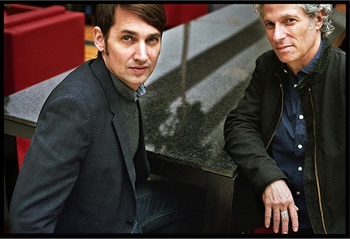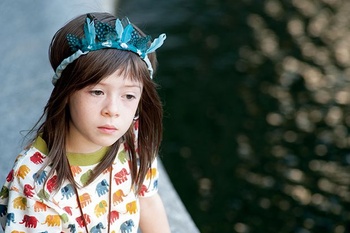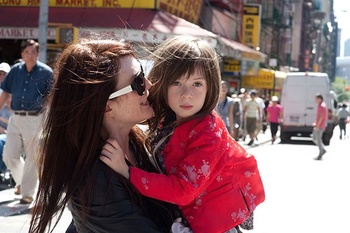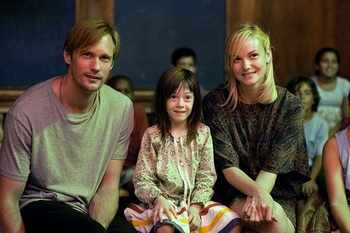(© Kris Dewitte)
A drama about a messy divorce? That’s not going to tempt many people to break into a sprint to get to the cinema. But make no mistake: with the help of Julianne Moore and the rest of a strong cast, the US directors Scott McGehee and David Siegel have made a fascinating film of What Maisie Knew. “We are in the middle of the greatest shift ever in the production and consumption of films,” they told us.
Have you come across Scott McGehee and David Siegel before? Because Uncertainty (2009) wasn’t released here (and things weren’t much better elsewhere), the last time we saw work by the two of them was in Bee Season (2005). And that film, with Juliette Binoche and Richard Gere as the parents of a spelling genius, was not quite up to the screenwriting-producing-directing duo’s usual standards. Siegel and McGehee made their name with the clever existential thriller Suture (1993) and the suspenseful The Deep End (2001). At Film Fest Gent they presented What Maisie Knew, the story of the divorce of an egocentric rock singer, Susanna (Julianne Moore), and a British art dealer, Beale (Steve Coogan), as seen through the eyes of their emotionally neglected six-year-old daughter, Maisie, who is superbly played by newcomer Onata Aprile.
McGehee & Siegel: What Maisie Knew


A drama about a messy divorce? To be honest, I had my doubts.
Scott McGehee: We were doubtful too.
David Siegel: For me, it wasn’t a selling point that the screenplay was an adaptation of a story by Henry James. It is mainly people who are crazy about Henry James who are keen on that book. The book is darker and covers a much longer period than the film. Be that as it may, we only pricked up our ears when the agent said that Julianne Moore was interested in the script he wanted us to read.
McGehee: We weren’t dying to work with children. We had already done that in Bee Season. And we didn’t think much of the idea of the fight over custody. That’s been done before. But we were pleasantly surprised by the light touch in the screenplay. Looking through the eyes of a six-year-old girl gives the material a certain innocent, funny, light-hearted quality.
Siegel: It was only after a lengthy conversation with Julianne Moore that we came round to the idea. And only when we met Onata Aprile that we became really keen on it. The reassurance only came in the editing room. [Laughs]
The story demanded credibility. You guys are known for being stylists. Did you have to restrain yourselves?
McGehee: Not at all. What Maisie Knew is extremely stylised. We try stylistically to create a world that gives the viewer the feeling that nothing about it is stylised. But you have to work really hard to obtain that effect. What colour palette should we choose? How do we light things? What consequences does that have for the costuming? Every decision was taken with the aim of immersing the viewer in the child’s world.
Scott McGehee: We were doubtful too.
David Siegel: For me, it wasn’t a selling point that the screenplay was an adaptation of a story by Henry James. It is mainly people who are crazy about Henry James who are keen on that book. The book is darker and covers a much longer period than the film. Be that as it may, we only pricked up our ears when the agent said that Julianne Moore was interested in the script he wanted us to read.
McGehee: We weren’t dying to work with children. We had already done that in Bee Season. And we didn’t think much of the idea of the fight over custody. That’s been done before. But we were pleasantly surprised by the light touch in the screenplay. Looking through the eyes of a six-year-old girl gives the material a certain innocent, funny, light-hearted quality.
Siegel: It was only after a lengthy conversation with Julianne Moore that we came round to the idea. And only when we met Onata Aprile that we became really keen on it. The reassurance only came in the editing room. [Laughs]
The story demanded credibility. You guys are known for being stylists. Did you have to restrain yourselves?
McGehee: Not at all. What Maisie Knew is extremely stylised. We try stylistically to create a world that gives the viewer the feeling that nothing about it is stylised. But you have to work really hard to obtain that effect. What colour palette should we choose? How do we light things? What consequences does that have for the costuming? Every decision was taken with the aim of immersing the viewer in the child’s world.
It’s almost unbearable to watch what the parents, Julianne Moore and Steve Coogan, do to their daughter in the film. And yet they were not allowed to be monsters. Or have I got that wrong?
McGehee: There are some actors who are so vain that they never go too far and never do bad things before the camera. If necessary, they take refuge behind their character. But Julianne Moore and Steve Coogan aren’t like that. Quite the contrary. Julianne Moore went really far. During the editing, we even had to make the artistic decision to scale back the harshness a bit.
The most important set was in the West Village, New York, as it happens just around the corner from where Julianne lives. From time to time she was visited by her children or went home to eat. That was disorientating: in front of the camera she was playing a mad mother and one second later was she was the sweetest of mothers again. [Laughs]
Siegel: We almost always become friends with the actors and the rest of the crew.
McGehee: For the children, you even feel personally responsible. You spend a really long time working together intensively, after all: from the rehearsals to filming to the promotion. Lots of things are new for a child. You get to know them well. I almost felt like a co-parent.
McGehee: There are some actors who are so vain that they never go too far and never do bad things before the camera. If necessary, they take refuge behind their character. But Julianne Moore and Steve Coogan aren’t like that. Quite the contrary. Julianne Moore went really far. During the editing, we even had to make the artistic decision to scale back the harshness a bit.
The most important set was in the West Village, New York, as it happens just around the corner from where Julianne lives. From time to time she was visited by her children or went home to eat. That was disorientating: in front of the camera she was playing a mad mother and one second later was she was the sweetest of mothers again. [Laughs]
Siegel: We almost always become friends with the actors and the rest of the crew.
McGehee: For the children, you even feel personally responsible. You spend a really long time working together intensively, after all: from the rehearsals to filming to the promotion. Lots of things are new for a child. You get to know them well. I almost felt like a co-parent.

You have worked with Tilda Swinton, Juliette Binoche, and Julianne Moore. A nice hat trick. Do you see mostly differences or similarities between the three of them?
Siegel: They are three talented, intelligent, beautiful women with strong personalities, but nonetheless I mainly see differences. Each has her own personality and way of working.
Swinton only became a film star when she was 45! [Laughs]. Outside England, nobody recognised her when we made The Deep End together. I’m glad her career really took off after that.
McGehee: Binoche, for her part, had no SAG card [the Screen Actors Guild is a trade union for film actors – NR]. We had to go through a cumbersome bureaucratic procedure to get her into our film. She was famous and had even won an Academy Award, but that was almost outweighed by the missing SAG card.
Film Fest Gent has a section of its programme devoted to American Independent Cinema. Are things going well or badly there? I hear lots of stories about how difficult things have become. But at the same time I can see that there are lots of indie films being made and that some of them are really good.
Siegel: I would be happy to answer, but if you open that particular can we’re off for the next two hours. So many factors play a role. For example, the present distribution climate and the production possibilities: technically speaking, it has become easier to make a film, but the costs of bringing a film out are huge. A great many small films do make it into the cinemas these days, but they don’t last two seconds there. They’re gone again immediately and barely earn 80,000 or even 25,000 dollars. In that sort of case, a cinema release is pointless. But everyone wants to get their films into the cinema.
Siegel: They are three talented, intelligent, beautiful women with strong personalities, but nonetheless I mainly see differences. Each has her own personality and way of working.
Swinton only became a film star when she was 45! [Laughs]. Outside England, nobody recognised her when we made The Deep End together. I’m glad her career really took off after that.
McGehee: Binoche, for her part, had no SAG card [the Screen Actors Guild is a trade union for film actors – NR]. We had to go through a cumbersome bureaucratic procedure to get her into our film. She was famous and had even won an Academy Award, but that was almost outweighed by the missing SAG card.
Film Fest Gent has a section of its programme devoted to American Independent Cinema. Are things going well or badly there? I hear lots of stories about how difficult things have become. But at the same time I can see that there are lots of indie films being made and that some of them are really good.
Siegel: I would be happy to answer, but if you open that particular can we’re off for the next two hours. So many factors play a role. For example, the present distribution climate and the production possibilities: technically speaking, it has become easier to make a film, but the costs of bringing a film out are huge. A great many small films do make it into the cinemas these days, but they don’t last two seconds there. They’re gone again immediately and barely earn 80,000 or even 25,000 dollars. In that sort of case, a cinema release is pointless. But everyone wants to get their films into the cinema.

McGehee: Over the last ten or fifteen years the number of cinema tickets sold has hardly fallen at all, but the number of independent films has risen spectacularly, while the tent poles [super-blockbusters that can keep a studio going on their own – NR] have been taking a bigger chunk of the market. In other words, a much larger group of indies is fighting over a smaller slice of the cake.
From a creative point of view, it’s great that your film can also exist outside the box office. There are the festivals. You can e-mail anyone a link to your film. But nobody has yet figured out how you can make a financial profit out of that. And how are people going to find the films they want to see in future? There is no coherent, compelling conversation about film any more.
You guys are racking your brains over it.
Siegel: We are in the middle of the greatest shift ever in the production and consumption of films. Anyone who isn’t thinking about that is sticking his head in the sand.
WHAT MAISIE KNEW ●●● US, 2013, dir.: Scott McGehee, David Siegel, act.: Julianne Moore, Steve Coogan, Onata Aprile, 98 min.
From a creative point of view, it’s great that your film can also exist outside the box office. There are the festivals. You can e-mail anyone a link to your film. But nobody has yet figured out how you can make a financial profit out of that. And how are people going to find the films they want to see in future? There is no coherent, compelling conversation about film any more.
You guys are racking your brains over it.
Siegel: We are in the middle of the greatest shift ever in the production and consumption of films. Anyone who isn’t thinking about that is sticking his head in the sand.
WHAT MAISIE KNEW ●●● US, 2013, dir.: Scott McGehee, David Siegel, act.: Julianne Moore, Steve Coogan, Onata Aprile, 98 min.
Read more about: Film
Fijn dat je wil reageren. Wie reageert, gaat akkoord met onze huisregels. Hoe reageren via Disqus? Een woordje uitleg.